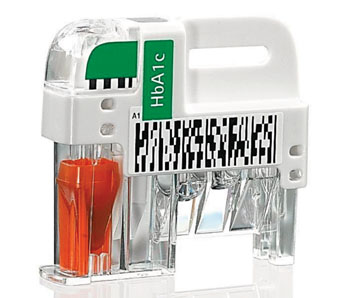Point-of-Care Diagnostic Test for Diabetes Reviewed
|
By LabMedica International staff writers Posted on 31 Aug 2016 |

Image: The Afinion HbA1c assay tests for quantitative determination of glycated Hemoglobin (HbA1c) in human whole blood (Photo courtesy of Alere).
Supporters of point-of-care (POC) HbA1c testing emphasized its advantages, particularly the increased access it affords patients and the potential for more timely treatment changes that could improve glycemic control. Such tests also enable clinicians to discuss the results with patients before they leave the examination room, rather than requiring a follow-up visit.
The system is identical to one already used to monitor patients with diabetes. That test has received a Clinical Laboratory Improvement Amendments (CLIA) waiver and can be used in numerous POC clinical settings with no required training. The US Food and Drug Administration (FDA, Silver Springs, MD, USA) typically convenes panels to provide a recommendation on approval. Although it is not required to follow the advice of such panels, it typically does.
In accuracy studies of the Alere Afinion HbA1c Dx, (Alere, Waltham, MA, USA) the total error estimates for the test based on venous whole blood precision estimates ranged from 2.25% to 3.16%, within the acceptance criterion for total error. The total error estimates for the test based on fingerstick whole blood ranged from 1.41% to 4.05%, also within the acceptance criterion of less than 6%. POC diabetes diagnostics is somewhat controversial. The American Diabetes Association (ADA) did not recommend such assays for diagnostic purposes in its 2016 guidelines, citing a lack of required proficiency testing. The missing support is the main reason the FDA asked for the panel review.
Robert E. Ratner, MD, the ADA chief scientific and medical officer, said, “Using the test to monitor patients already diagnosed with diabetes is appropriate because it doesn’t require the same degree of accuracy as a diagnostic test.” However, Richard Kahn, PhD, a clinical professor of medicine at the University of North Carolina in Chapel Hill, disputed that claim, arguing that POC testing could improve the diagnosis of diabetes (currently about a third of people with diabetes are undiagnosed) with little risk of false positives or negatives.
Related Links:
US Food and Drug Administration
Alere
The system is identical to one already used to monitor patients with diabetes. That test has received a Clinical Laboratory Improvement Amendments (CLIA) waiver and can be used in numerous POC clinical settings with no required training. The US Food and Drug Administration (FDA, Silver Springs, MD, USA) typically convenes panels to provide a recommendation on approval. Although it is not required to follow the advice of such panels, it typically does.
In accuracy studies of the Alere Afinion HbA1c Dx, (Alere, Waltham, MA, USA) the total error estimates for the test based on venous whole blood precision estimates ranged from 2.25% to 3.16%, within the acceptance criterion for total error. The total error estimates for the test based on fingerstick whole blood ranged from 1.41% to 4.05%, also within the acceptance criterion of less than 6%. POC diabetes diagnostics is somewhat controversial. The American Diabetes Association (ADA) did not recommend such assays for diagnostic purposes in its 2016 guidelines, citing a lack of required proficiency testing. The missing support is the main reason the FDA asked for the panel review.
Robert E. Ratner, MD, the ADA chief scientific and medical officer, said, “Using the test to monitor patients already diagnosed with diabetes is appropriate because it doesn’t require the same degree of accuracy as a diagnostic test.” However, Richard Kahn, PhD, a clinical professor of medicine at the University of North Carolina in Chapel Hill, disputed that claim, arguing that POC testing could improve the diagnosis of diabetes (currently about a third of people with diabetes are undiagnosed) with little risk of false positives or negatives.
Related Links:
US Food and Drug Administration
Alere
Latest Clinical Chem. News
- Simple Blood Test Offers New Path to Alzheimer’s Assessment in Primary Care
- Existing Hospital Analyzers Can Identify Fake Liquid Medical Products
- Rapid Blood Testing Method Aids Safer Decision-Making in Drug-Related Emergencies
- New PSA-Based Prognostic Model Improves Prostate Cancer Risk Assessment
- Extracellular Vesicles Linked to Heart Failure Risk in CKD Patients
- Study Compares Analytical Performance of Quantitative Hepatitis B Surface Antigen Assays
- Blood Test Could Predict and Identify Early Relapses in Myeloma Patients
- Compact Raman Imaging System Detects Subtle Tumor Signals
- Noninvasive Blood-Glucose Monitoring to Replace Finger Pricks for Diabetics
- POC Breath Diagnostic System to Detect Pneumonia-Causing Pathogens
- Online Tool Detects Drug Exposure Directly from Patient Samples
- Chemical Imaging Probe Could Track and Treat Prostate Cancer
- Mismatch Between Two Common Kidney Function Tests Indicates Serious Health Problems
- VOCs Show Promise for Early Multi-Cancer Detection
- Portable Raman Spectroscopy Offers Cost-Effective Kidney Disease Diagnosis at POC
- Gold Nanoparticles to Improve Accuracy of Ovarian Cancer Diagnosis
Channels
Molecular Diagnostics
view channel
Changes In Lymphatic Vessels Can Aid Early Identification of Aggressive Oral Cancer
Oral cancers are the most common malignant tumors in the head and neck region and cause more than 188,000 deaths worldwide each year. Unlike many other cancers, even small, early-stage oral tumors can... Read more
Molecular Monitoring Approach Helps Bladder Cancer Patients Avoid Surgery
Muscle-invasive bladder cancer is typically treated with chemotherapy followed by radical cystectomy, the complete removal of the bladder. While often effective, the surgery significantly affects quality... Read more
Genetic Tests to Speed Diagnosis of Lymphatic Disorders
Defects in the lymphatic system affect approximately one in every 3,500 newborns and can lead to severe complications, including organ failure, breathing difficulties, and life-threatening infections.... Read more
New Extraction Kit Enables Consistent, Scalable cfDNA Isolation from Multiple Biofluids
Circulating cell-free DNA (cfDNA) found in plasma, serum, urine, and cerebrospinal fluid is typically present at low concentrations and is often highly fragmented, making efficient recovery challenging... Read moreHematology
view channel
Rapid Cartridge-Based Test Aims to Expand Access to Hemoglobin Disorder Diagnosis
Sickle cell disease and beta thalassemia are hemoglobin disorders that often require referral to specialized laboratories for definitive diagnosis, delaying results for patients and clinicians.... Read more
New Guidelines Aim to Improve AL Amyloidosis Diagnosis
Light chain (AL) amyloidosis is a rare, life-threatening bone marrow disorder in which abnormal amyloid proteins accumulate in organs. Approximately 3,260 people in the United States are diagnosed... Read moreImmunology
view channel
New Biomarker Predicts Chemotherapy Response in Triple-Negative Breast Cancer
Triple-negative breast cancer is an aggressive form of breast cancer in which patients often show widely varying responses to chemotherapy. Predicting who will benefit from treatment remains challenging,... Read moreBlood Test Identifies Lung Cancer Patients Who Can Benefit from Immunotherapy Drug
Small cell lung cancer (SCLC) is an aggressive disease with limited treatment options, and even newly approved immunotherapies do not benefit all patients. While immunotherapy can extend survival for some,... Read more
Whole-Genome Sequencing Approach Identifies Cancer Patients Benefitting From PARP-Inhibitor Treatment
Targeted cancer therapies such as PARP inhibitors can be highly effective, but only for patients whose tumors carry specific DNA repair defects. Identifying these patients accurately remains challenging,... Read more
Ultrasensitive Liquid Biopsy Demonstrates Efficacy in Predicting Immunotherapy Response
Immunotherapy has transformed cancer treatment, but only a small proportion of patients experience lasting benefit, with response rates often remaining between 10% and 20%. Clinicians currently lack reliable... Read moreMicrobiology
view channel
Three-Test Panel Launched for Detection of Liver Fluke Infections
Parasitic liver fluke infections remain endemic in parts of Asia, where transmission commonly occurs through consumption of raw freshwater fish or aquatic plants. Chronic infection is a well-established... Read more
Rapid Test Promises Faster Answers for Drug-Resistant Infections
Drug-resistant pathogens continue to pose a growing threat in healthcare facilities, where delayed detection can impede outbreak control and increase mortality. Candida auris is notoriously difficult to... Read more
CRISPR-Based Technology Neutralizes Antibiotic-Resistant Bacteria
Antibiotic resistance has accelerated into a global health crisis, with projections estimating more than 10 million deaths per year by 2050 as drug-resistant “superbugs” continue to spread.... Read more
Comprehensive Review Identifies Gut Microbiome Signatures Associated With Alzheimer’s Disease
Alzheimer’s disease affects approximately 6.7 million people in the United States and nearly 50 million worldwide, yet early cognitive decline remains difficult to characterize. Increasing evidence suggests... Read morePathology
view channel
Single Sample Classifier Predicts Cancer-Associated Fibroblast Subtypes in Patient Samples
Pancreatic ductal adenocarcinoma (PDAC) remains one of the deadliest cancers, in part because of its dense tumor microenvironment that influences how tumors grow and respond to treatment.... Read more
New AI-Driven Platform Standardizes Tuberculosis Smear Microscopy Workflow
Sputum smear microscopy remains central to tuberculosis treatment monitoring and follow-up, particularly in high‑burden settings where serial testing is routine. Yet consistent, repeatable bacillary assessment... Read more
AI Tool Uses Blood Biomarkers to Predict Transplant Complications Before Symptoms Appear
Stem cell and bone marrow transplants can be lifesaving, but serious complications may arise months after patients leave the hospital. One of the most dangerous is chronic graft-versus-host disease, in... Read moreTechnology
view channel
Blood Test “Clocks” Predict Start of Alzheimer’s Symptoms
More than 7 million Americans live with Alzheimer’s disease, and related health and long-term care costs are projected to reach nearly USD 400 billion in 2025. The disease has no cure, and symptoms often... Read more
AI-Powered Biomarker Predicts Liver Cancer Risk
Liver cancer, or hepatocellular carcinoma, causes more than 800,000 deaths worldwide each year and often goes undetected until late stages. Even after treatment, recurrence rates reach 70% to 80%, contributing... Read more
Robotic Technology Unveiled for Automated Diagnostic Blood Draws
Routine diagnostic blood collection is a high‑volume task that can strain staffing and introduce human‑dependent variability, with downstream implications for sample quality and patient experience.... Read more
ADLM Launches First-of-Its-Kind Data Science Program for Laboratory Medicine Professionals
Clinical laboratories generate billions of test results each year, creating a treasure trove of data with the potential to support more personalized testing, improve operational efficiency, and enhance patient care.... Read moreIndustry
view channel
QuidelOrtho Collaborates with Lifotronic to Expand Global Immunoassay Portfolio
QuidelOrtho (San Diego, CA, USA) has entered a long-term strategic supply agreement with Lifotronic Technology (Shenzhen, China) to expand its global immunoassay portfolio and accelerate customer access... Read more










 (3) (1).png)



